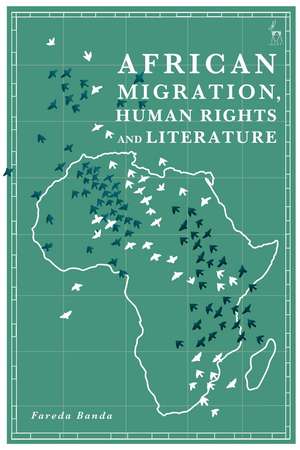African Migration, Human Rights and Literature
Autor Dr Fareda Bandaen Limba Engleză Hardback – 23 dec 2020
| Toate formatele și edițiile | Preț | Express |
|---|---|---|
| Paperback (1) | 254.32 lei 43-57 zile | |
| Bloomsbury Publishing – 22 iun 2022 | 254.32 lei 43-57 zile | |
| Hardback (1) | 681.54 lei 43-57 zile | |
| Bloomsbury Publishing – 23 dec 2020 | 681.54 lei 43-57 zile |
Preț: 681.54 lei
Preț vechi: 841.41 lei
-19% Nou
Puncte Express: 1022
Preț estimativ în valută:
130.41€ • 136.53$ • 107.91£
130.41€ • 136.53$ • 107.91£
Carte tipărită la comandă
Livrare economică 07-21 aprilie
Preluare comenzi: 021 569.72.76
Specificații
ISBN-13: 9781509938346
ISBN-10: 1509938346
Pagini: 376
Dimensiuni: 156 x 234 x 30 mm
Greutate: 0.71 kg
Editura: Bloomsbury Publishing
Colecția Hart Publishing
Locul publicării:London, United Kingdom
ISBN-10: 1509938346
Pagini: 376
Dimensiuni: 156 x 234 x 30 mm
Greutate: 0.71 kg
Editura: Bloomsbury Publishing
Colecția Hart Publishing
Locul publicării:London, United Kingdom
Caracteristici
Addresses important and understudied themes in the field of law and literature
Notă biografică
Fareda Banda is Professor of Law at SOAS, University of London.
Cuprins
Introduction I. My Law and Literature Journey II. On Migration III. On Terminology IV. On Coverage V. Structure VI. Conclusion PART IPLOTTING OUR JOURNEY1. Artivism, Literature, Law and Justice I. Justice in Law and Literature II. On Transplants and Universality III. Literature as Protest in Post-Colonial Settings IV. Music, Art and Photography V. On Writing Justice VI. Critical Race Feminists VII. Literature and Historic Injustice VIII. Conclusion 2. Migration Histories I. On 'Home' and Identity Formation II. The African Diasporas - Historical Background III. Contemporary Migration Patterns and Responses IV. Resistance and the Imperial LegacyV. Conclusion 3. Of Visas and Visions of a Better Life I. By any Means Necessary II. Fictional Strategies for Gaining Entry III. Processes IV. The Moral Economy of Smuggling V. You can Buy Your Way in Legitimately - Wealth and Visa Waivers VI. On Slippery Categorisations: 'Illegal' Migrant v ('Bogus') Asylum Seeker? VII. Refugee Law and Literature VIII. Credibility IX. Access to Justice X. Detention XI. Hostile Environments XII. Irregularity and Employment XIII. Irregularity and the Exposure to Exploitation by Non-State Actors XIV. Public Perception and Prejudice XV. On Dignity XVI. 'Home' and the Inhospitable Human Rights Environment XVII. Status Fracture v. Status Threat XVIII. On Kindness: Refugee and Migrant Organisations and Volunteers XIX. Conclusion PART IIINTERSECTIONS4. Women's Lives I. Historical Reasons for Restrictions on Women's Freedom of Movement II. Women and Refugee Law III. Trafficking in Law and Literature IV. Whither Sisterhood? Race and Class in Cleaning Work V. Norm Development and the Challenges of Implementation VI. Legislative and Judicial Responses to Modern Slavery VII. Fictional Maids VIII. Undiplomatic Exploitation and Abuse IX. Called to Account: Maids Confront Diplomats in Court X. Other Forms of Labour XI. Hotel Maids Wanted: Abuse Included XII. The Ache: Missing those Left Behind XIII. Conclusion 5. Sexual Orientation and Gender Identities I. History, Context and Continuities II. On Erasure and the Demand for Visibility III. On Intersectionality IV. Plural Identities or 'Naming' 0V. On Fear and Curiosity VI. Fictional Literature VII. On Covering VIII. Religion IX. Changing People, Changing Laws X. Migration and Sexuality XI. Reasons to be Hopeful XII. Conclusion 6. Children in Literature I. The Role of Literature II. Children in Migration III. Citizen or Migrant? IV. Laws and 'Cultural Practices' V. Conclusion ConclusionI. Law and Migration II. Looking Ahead
Recenzii
[The book] serves not only as an important supplement to the legal materials used by those working in the area, but also as an accessible source for enhancing general awareness of and sensitivity to the realities. The richness and poignancy of the narratives throughout this book show how necessary this is.
[The book] offers value to a broad range of possible readers, including activists, lawyers, scholars of literature, law and/or migration, and general readers interested in the intersection of literature, human rights, and migration. Fareda Banda offers a journey with an enduring impact for its readers.
[The book] offers value to a broad range of possible readers, including activists, lawyers, scholars of literature, law and/or migration, and general readers interested in the intersection of literature, human rights, and migration. Fareda Banda offers a journey with an enduring impact for its readers.
